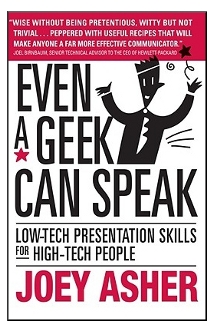XRDS: Resources for Students
The Academic Job Search:
The Job Talk
By Matt Might
When searching for, applying to, and interviewing for academic jobs (meaning jobs as a professor--and usually if you're lucky you'll aim for a tenure-track position) you'll have to prepare for a "job talk."
What is an Academic Job Talk?
 The academic job talk is a routine part of interviewing for a job as a professor. The job talk is a scheduled presentation in which the job candidates share their work with the department they are applying to. The faculty in the department are the audience, and they use the job talk to form an opinion about the candidate's work.
The academic job talk is a routine part of interviewing for a job as a professor. The job talk is a scheduled presentation in which the job candidates share their work with the department they are applying to. The faculty in the department are the audience, and they use the job talk to form an opinion about the candidate's work.
An academic job talk is unlike any talk you have ever given. For starters, you have to be absolutely certain that your audience understands every word of it, and they have to be excited about what they hear. A successful job talk can be the deal-breaker for a group of people who are deciding whether they want to have you in their department, working next to them every day, for at least the next six years!
Tips for Preparing Your Job Talk
- Prepare your job materials and your job talk for a general audience.
- Attend other job talks and take notes. What worked? What didn't work?
- Rehearse your job talk 10 times before you give it the first time, and rehearse it twice before each subsequent delivery. "Rehearse" means say it out loud to another person. You'll find a big difference between what you think you will say and what actually comes out of your mouth the first time you practice.
- Use charts, statistics, anecdotes, quotes, video clips, and animations to motivate your field and your research.
- Every field in science and engineering has camps at two poles: theory and experimentation, so strike a balance between them.
- In explaining what you do as an academic or researcher, you may have to cover a lot of background material that you wouldn't normally cover. That's fine, especially when you consider that your talk is also used to measure your teaching ability.
- Don't cover all your work in detail. Aim for a slice that people can understand.
- Expect people to ask questions during your talk.
- A little polite self-deprecating humor helps sell you as a person.
- Talk to your contacts at the department or university to find out what kinds of things are of greatest interest to them and what they look for in professors. Use their insight to help put the right angle on your talk.
The book Even a Geek Can Speak saved my job talk; I highly recommend it.
For additional advice, see "Giving a Job Talk in the Sciences," by Richard M. Reis, published in The Chronicle of Higher Education in 2001.
Additional Resources
"Giving a Job Talk in the Sciences," by Richard M. Reis, The Chronicle of Higher Education (2001)
Even a Geek Can Speak by Joey Asher (2006, second edition)
Tomorrow's Professor: Preparing for Academic Careers in Science and Engineering by Richard M. Reis (1997, Wiley-IEEE Press)

